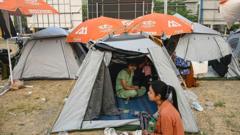Saudi Arabia's Al-Ula is poised for transformation as hotel developments and public art projects emerge, attracting tourists eager to explore its stunning natural features. This shift is tied to the nation's efforts to diversify its economy and enhance its global image, although concerns regarding human rights and cultural impacts persist.
Rapid Transformation of Al-Ula: Saudi Arabia’s New Tourism Frontier

Rapid Transformation of Al-Ula: Saudi Arabia’s New Tourism Frontier
Al-Ula's breathtaking landscapes are on the brink of major tourism development, raising questions about cultural preservation and sustainable growth.
Al-Ula, a remote yet breathtaking region in northwest Saudi Arabia, is experiencing rapid changes as the country aims to broaden its appeal to international tourists. Registered traveler David Belcher reports that this transformation is reminiscent of changes seen in fast-developing places like Dubai. For travelers seeking untouched destinations, Al-Ula has recently become a focal point, where vast sandstone and granite formations currently dominate the landscape but are on the verge of significant tourist development.
Saudi Arabia's tourism strategy is a relatively recent initiative, which began around six years ago when the country opened its doors to visitors beyond those on religious pilgrimages. The appeal of Al-Ula is heightened by its historical significance as part of the Nabatean empire, famous for its marvels like Petra, located 340 miles away in Jordan. However, as plans unfold for potentially numerous hotels and attractions, visitors worry that this hidden gem will lose its pristine allure to rushed commercialization.
The evolving landscape also reflects Saudi Arabia's broader efforts for image enhancement as it grapples with its controversial past concerning human rights issues. Daily life in Riyadh and Jeddah shows signs of modernity with new social reforms, such as allowing women the freedom to drive and travel alone. Despite these advancements, other restrictions, including a ban on alcohol, continue to raise concerns for potential visitors. The kingdom's strategy also aligns with its ambitious Saudi Vision 2030, aimed at economic diversification.
As visitors contemplate whether now is the time to explore Al-Ula before it becomes a tourist hotspot, the region's transformation embodies a complex balance between promoting tourism and preserving cultural heritage. Enthusiasts looking for undiscovered places might need to act swiftly before Al-Ula becomes a mainstream destination, echoing concerns seen in other rapidly commercialized tourist locales.



















